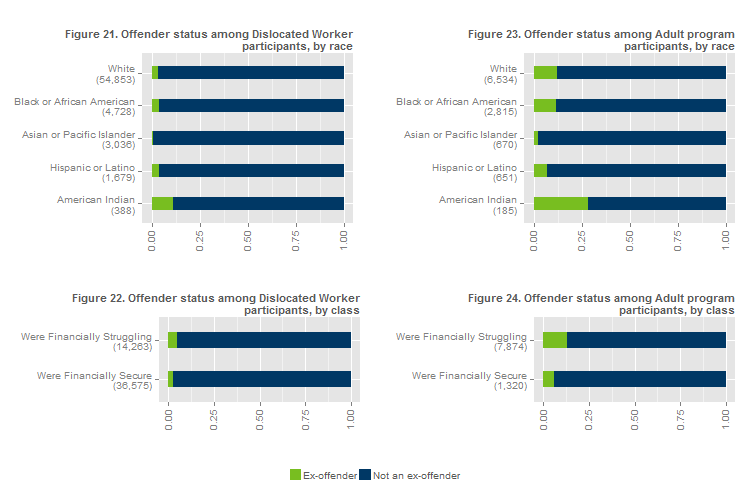Participants are asked in the enrollment process whether they have a criminal background. Although a criminal record is clearly relevant to a job search, some participants may feel reluctant to disclose this information, especially to a counselor they have just met. One program manager reported that some participants who had not been through a job application process for a decade or more simply did not realize they had a criminal record for recent offenses. For these reasons, the self-reported offender status in these figures are best interpreted as an undercount of the true number of participants with a criminal background.

More American Indian participants than any other racial group report having a criminal background at the time of program enrollment (Figure 21 and Figure 23). Similarly, those who were financially struggling prior to program enrollment report a higher offender status rate than those who were financially secure (Figure 22 and Figure 24). Asian or Pacific Islander participants report virtually no criminal backgrounds.
According to the Council on Crime and Justice, "[c]ompared to other states, Minnesota has the greatest black-to-white disparity in imprisonment rates. In 1997, the most recent year for which state-by-state data are available, the ratio of African Americans to whites in state prison was 25.09 to 1." (See Note 1)
More recently, the American Civil Liberties Union found racial disparities in low-level arrests (for offenses such as marijuana possession, loitering, or vagrancy) in Minneapolis. This analysis finds that "between 2004 and 2012, an African American individual was, on average, 11.5 times more likely to be arrested than a white individual for marijuana possession." (See Note 2)
Meanwhile, job seeking with a criminal background is among the most frequently reported barriers to employment. Over half of the program managers we interviewed said having a criminal background is among the most significant employment barriers faced by their program participants. Nine percent of counselor respondents reported that a criminal history is the most common personal barrier to obtaining high-quality, living-wage employment faced by their participants. Nine percent of counselor respondents also reported that a criminal history is a barrier to engaging in longer-term training, in some cases because of the occupational restrictions it brings.
Some of the counselors who reported a criminal history being a significant barrier for their participants also reported addressing that barrier by counseling participants about how to have a record expunged. Multiple program managers said counseling around how to talk about a criminal record in a job interview can be effective, as well as employer education around the federal bonding program and the Work Opportunity Tax Credit. Most also reported that they have a sense of which employers will be open to applicants with a criminal history, and advise participants accordingly.
When asked about common employment barriers, one interviewee said,
"[T]here's some internal barriers that they [participants] hold within themselves. Confidence is huge. It's never really a lack of skill, because a number of our clients have a wealth of skills to use. It's just they don't spend a whole lot of time on jobs because of not knowing how to resolve conflict or work in a team environment in the proper way. [...Regarding] the criminal background, I think the lack of confidence comes in [...] because they identify with that [criminal background] being them as opposed to their skills being the defining thing [about] themselves. So there's a lot of internal barriers that-those are kind of the hardest to uncover, because the participant doesn't even realize that they exist."